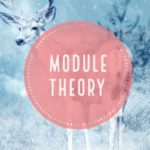Torsion Submodule, Integral Domain, and Zero Divisors

Problem 409
Let $R$ be a ring with $1$. An element of the $R$-module $M$ is called a torsion element if $rm=0$ for some nonzero element $r\in R$.
The set of torsion elements is denoted
\[\Tor(M)=\{m \in M \mid rm=0 \text{ for some nonzero} r\in R\}.\]
(a) Prove that if $R$ is an integral domain, then $\Tor(M)$ is a submodule of $M$.
(Remark: an integral domain is a commutative ring by definition.) In this case the submodule $\Tor(M)$ is called torsion submodule of $M$.
(b) Find an example of a ring $R$ and an $R$-module $M$ such that $\Tor(M)$ is not a submodule.
(c) If $R$ has nonzero zero divisors, then show that every nonzero $R$-module has nonzero torsion element.
Sponsored Links
Contents
Proof.
(a) Prove that if $R$ is an integral domain, then $\Tor(M)$ is a submodule of $M$.
To prove $\Tor(M)$ is a submodule of $M$, we check the following submodule criteria:
- $\Tor(M)$ is not empty.
- For any $m, n\in \Tor(M)$ and $t\in R$, we have $m+tn\in M$.
It is clear that the zero element $0$ in $M$ is in $\Tor(M)$, hence condition 1 is met.
To prove condition 2, let $m, n \in \Tor(M)$ and $t\in R$.
Since $m, n$ are torsion elements, there exist nonzero elements $r, s\in R$ such that $rm=0, sn=0$.
Since $R$ is an integral domain, the product $rs$ of nonzero elements is nonzero.
We have
\begin{align*}
rs(m+tn)&=rsm+rstn\\
&=s(rm)+rt(sn) &&\text{($R$ is commutative)}\\
&=s0+rt0=0.
\end{align*}
This yields that $m+tn$ is a torsion elements, hence $m+tn\in \Tor(M)$.
This condition 2 is met as well, and we conclude that $\Tor(M)$ is a submodule of $M$.
(b) Find an example of a ring $R$ and an $R$-module $M$ such that $\Tor(M)$ is not a submodule.
Let us consider $R=\Zmod{6}$ and let $M$ be the $R$-module $R$.
We just simply write $n$ for the element $n+6\Z$ in $R=\Zmod{6}$.
Then we have
\[3\cdot 2=0 \text{ and } 2\cdot 3=0.\]
This implies that $2$ and $3$ are torsion elements of the module $M$.
However, the sum $5=2+3$ is not a torsion element in $M$ since if $r\cdot 5=0$ in $\Zmod{6}$, then $r=0$.
Thus, $\Tor(M)$ is not closed under addition. Hence it is not a submodule of $M$.
(c) If $R$ has nonzero zero divisors, then show that every nonzero $R$-module has nonzero torsion element.
Let $r$ be nonzero zero divisors of $R$. That is, there exists a nonzero element $s\in R$ such that $rs=0$. Let $M$ be a nonzero $R$-module and let $m$ be a nonzero element in $M$.
Put $n=sm$.
If $n=0$, then this implies $m$ is a nonzero torsion element of $M$, and we are done.
If $n\neq 0$, then we have
\begin{align*}
rn=r(sm)=(rs)m=0m=0.
\end{align*}
This yields that $n$ is a nonzero torsion element of $M$.
Hence, in either case, we obtain a nonzero torsion element of $M$. This completes the proof.
 Add to solve later
Add to solve later
Sponsored Links












